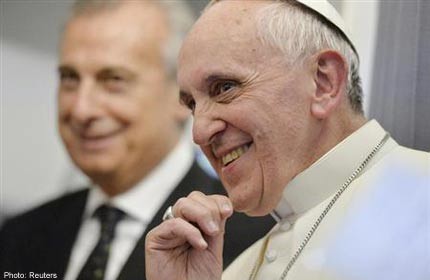Pope's visit help Brazilian leaders to eat humble pie

SAO PAULO - With hecklers outside his beachfront apartment and an approval rating down to 12 per cent, Rio de Janeiro state Governor Sergio Cabral has turned to a new source for inspiration: Pope Francis.
"The pope touched me," Cabral told reporters this week after the pontiff's visit to the world's largest Roman Catholic country for World Youth Day.
"I really did need a dose of humility. It was wrong of me not to listen," Cabral said. "I learned from the pope's visit, to listen to the other side. I'm open to listening."
Pope Francis left on Sunday night, but Brazil's beleaguered politicians haven't stopped trying to capture a bit of his magic. Leaders including President Dilma Rousseff have copied his gestures and quoted him at length as they search for ways to reconnect with the masses after nationwide street protests.
The rock-star treatment given to Pope Francis during his weeklong visit, which culminated in a Sunday Mass that drew 3 million adoring believers to Rio's Copacabana beach, was the mirror opposite of what Brazil's secular leaders are inspiring.
In June, more than a million people took to the streets in a series of protests to vent their fury over a long list of grievances including corruption, police violence, poor public transportation and a stagnant economy.
The demonstrations have become much smaller in recent weeks, but polls show the fallout continues to be devastating for most elected officials. The approval rating for Rousseff's government tumbled from 54 per cent in June to 31 per cent in July, and she and other incumbents will likely face a tough re-election battle next year.
Rousseff and others have repeatedly been booed in public appearances, while Cabral says he and his children have been unnerved by protesters camping outside their home.
It has been a shocking fall back to Earth for a generation of Brazilian leaders who, until a few months ago, were riding high on Brazil's decade-long economic boom and the international prestige that followed: winning bids to host to the 2014 football World Cup and 2016 Summer Olympics.
Pope Francis' emphasis on humility, authenticity and self-criticism could be a lesson for politicians such as Cabral, who developed a reputation for arrogance during the boom years, said Marcos Nobre, a professor of political philosophy who wrote an e-book about the protests.
"The pope put on a political show when he was here," Nobre said. "He showed all Brazilian politicians how you deal with a situation of mass dissatisfaction like the Catholic Church has seen in recent years."
"He's somebody who looks at you and says: 'I see that you're suffering, and I am one of you.' That's what people seem to want right now, not just in Brazil but globally," Nobre added. "It's obvious our leaders are trying to capture that."
WALKING AMONGST THE FLOCK
When Sao Paulo state Governor Geraldo Alckmin attended Pope Francis' Mass on July 24, he carried with him a well-worn, underlined copy of a book the pontiff wrote when he was still known as Jorge Bergoglio, archbishop of Buenos Aires.
"I'm reading his book right now," Alckmin told reporters. He even read two passages aloud, including one about the importance of walking amongst the people, as Jesus Christ did.
Indeed, Pope Francis' habit of spontaneously circulating among the masses in Rio - to the frustration of his security staff, but the delight of screaming fans - also seems to have rubbed off.
Rousseff was attending an event at city hall in downtown Sao Paulo on Wednesday when the head of a local retailers' union, apparently unprompted, invited her to walk over to his group's headquarters some 300 yards away.
"Defying the guidance of her security, the president broke protocol and accepted the invitation," said a statement released by the union late Wednesday. "On the way, the president was greeted by passers-by, she said hello to people and sent them kisses," a traditional Brazilian greeting among friends.
The gesture was rare from a leader who has cultivated a reputation as a competent manager, but is often criticised as distant and inaccessible.
Rousseff hardly ever gives interviews, but she sat down for nearly three hours with a Brazilian newspaper last Friday, while Pope Francis was still in the country. She struck a relaxed, personable tone, addressing the protests but also her preferred hairstylist and whether she was dating anyone. (The answer was no.)
A spokesperson at the presidential palace declined comment on whether Rousseff was following the pope's example.
It's unclear whether Brazilian politicians can capture any of the papal glow.
For one thing, Pope Francis himself repeatedly urged young people during his visit to keep pressure on politicians and not to give up hope in the fight against corruption.
Also, as Nobre pointed out, admitting to copying the pope's techniques may defeat the main purpose.
"It's not going to seem sincere if politicians say they're imitating someone else's behaviour," he said. "I believe in people's ability to change. But that's not a good start."